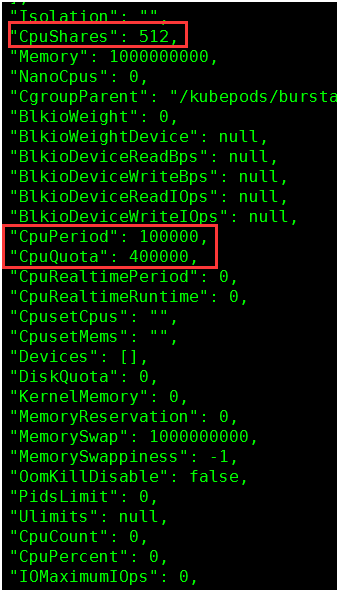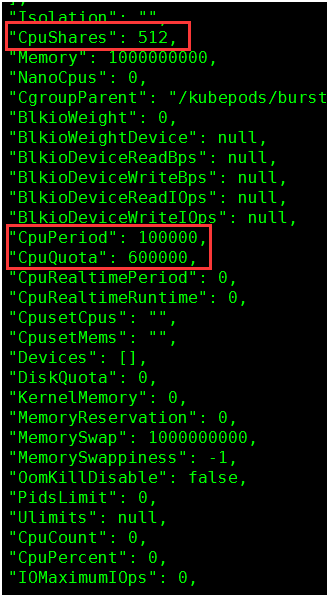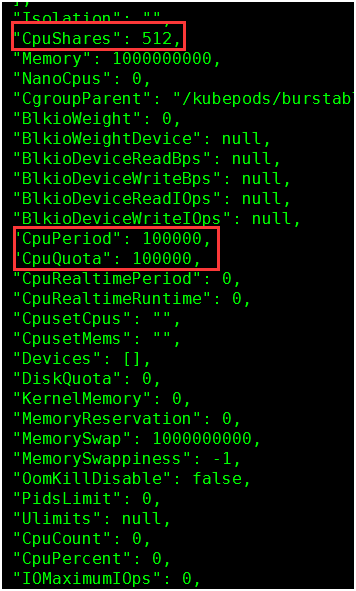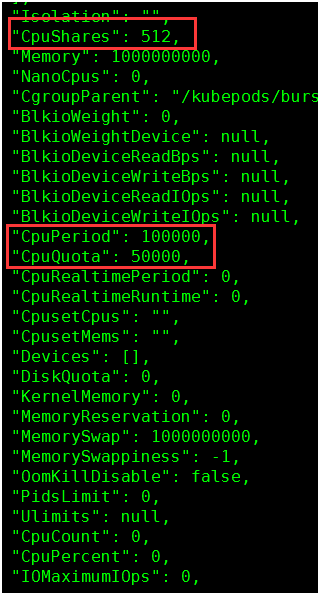这期内容当中小编将会给大家带来有关kubernetes cpu限制参数的说明是什么,文章内容丰富且以专业的角度为大家分析和叙述,阅读完这篇文章希望大家可以有所收获。
Option | Description |
--cpus=<value> | Specify how much of the available CPU resources a container can use. For instance, if the host machine has two CPUs and you set --cpus="1.5", the container is guaranteed at most one and a half of the CPUs. This is the equivalent of setting --cpu-period="100000" and --cpu-quota="150000". Available in Docker 1.13 and higher. |
--cpu-period=<value> | Specify the CPU CFS scheduler period, which is used alongside--cpu-quota. Defaults to 100 micro-seconds. Most users do not change this from the default. If you use Docker 1.13 or higher, use --cpusinstead. |
--cpu-quota=<value> | Impose a CPU CFS quota on the container. The number of microseconds per --cpu-period that the container is limited to before throttled. As such acting as the effective ceiling. If you use Docker 1.13 or higher, use --cpus instead. |
--cpuset-cpus | Limit the specific CPUs or cores a container can use. A comma-separated list or hyphen-separated range of CPUs a container can use, if you have more than one CPU. The first CPU is numbered 0. A valid value might be 0-3 (to use the first, second, third, and fourth CPU) or 1,3 (to use the second and fourth CPU). |
--cpu-shares | Set this flag to a value greater or less than the default of 1024 to increase or reduce the container’s weight, and give it access to a greater or lesser proportion of the host machine’s CPU cycles. This is only enforced when CPU cycles are constrained. When plenty of CPU cycles are available, all containers use as much CPU as they need. In that way, this is a soft limit. --cpu-shares does not prevent containers from being scheduled in swarm mode. It prioritizes container CPU resources for the available CPU cycles. It does not guarantee or reserve any specific CPU access. |
① --cpus指示容器可以使用的CPU数量。改参数指定的是百分比,并不是具体的个数。比如:主机有4个逻辑CPU,限制容器—cpus=2,那么该容器最多可以使用的CPU时间是200%,但是4个CPU分配的时间可能是每个CPU各50%,而不一定是有其中2个CPU使用100%,而另2个CPU使用0%。
--cpus是docker 1.13之后才出来的参数,目的是替代--cpu-period和--cpu-quota两个参数,从而使配置更简单。
② --cpu-period表示的是设置CPU时间周期,默认值是100000,单位是us,即0.1s。
③ --cpu-quota指示容器可以使用的最大的CPU时间,配合--cpu-period值使用。如果—cpu-quota=200000,即0.2s。那就是说在0.1s周期内改容器可以使用0.2s的CPU时间,显然1个CPU是无法满足要求的,需要至少2个CPU才能满足。
④ --cpuset-cpus设置容器具体可以使用哪些个CPU。如--cpuset-cpus=”0,1,2”或者--cpuset-cpus=”0-2”,则容器会使用第0-2个CPU。
⑤ --cpu-shares,容器使用CPU的权重,默认值是1024,数值越大权重越大。该参数仅当有多个容器竞争同一个CPU时生效。对于单核CPU,如果容器A设置为--cpu-shares=2048,容器B设置为--cpus-shres=1024,仅当两个容器需要使用的CPU时间超过整个CPU周期的时候,容器A会被分配66%的CPU时间,容器B被分配33%的CPU时间,大约是2:1;对于多核CPU,仅当多个容器竞争同一个CPU的时候该值生效。
第一种:资源对象LimitRange限制POD和Container的资源

apiVersion: v1
kind: LimitRange
metadata:
name: mylimits
spec:
limits:
- max:
cpu: "2"
memory: 1Gi
min:
cpu: 200m
memory: 6Mi
type: Pod
- default:
cpu: 300m
memory: 200Mi
defaultRequest:
cpu: 200m
memory: 100Mi
max:
cpu: "2"
memory: 1Gi
min:
cpu: 100m
memory: 3Mi
type: Container
spec:
containers:
- image: gcr.io/google_containers/serve_hostname
imagePullPolicy: Always
name: kubernetes-serve-hostname
resources:
limits:
cpu: "1"
memory: 512Mi
requests:
cpu: "1"
memory: 512Mi
2. docker stats查看容器CPU使用率
由于设置了CPUQuota是CpuPeriod的4倍,所以容器可以使用400% CPU


2. docker stats查看容器CPU使用率
容器可以使用600%的CPU,现在只用400%


2. docker stats查看容器CPU使用率
使用时间等于CpuPeriod,占用100%

从下图可以看到,有4个CPU分别使用25%,加起来是100%。所以limits.cpu:1并不一定表示容器只会占用1个CPU,而表示的是容器最多可以使用的CPU时间的比例。

2. docker stats查看容器CPU使用率

上述就是小编为大家分享的kubernetes cpu限制参数的说明是什么了,如果刚好有类似的疑惑,不妨参照上述分析进行理解。如果想知道更多相关知识,欢迎关注亿速云行业资讯频道。
亿速云「云服务器」,即开即用、新一代英特尔至强铂金CPU、三副本存储NVMe SSD云盘,价格低至29元/月。点击查看>>
免责声明:本站发布的内容(图片、视频和文字)以原创、转载和分享为主,文章观点不代表本网站立场,如果涉及侵权请联系站长邮箱:is@yisu.com进行举报,并提供相关证据,一经查实,将立刻删除涉嫌侵权内容。
原文链接:https://my.oschina.net/xiaominmin/blog/3068169